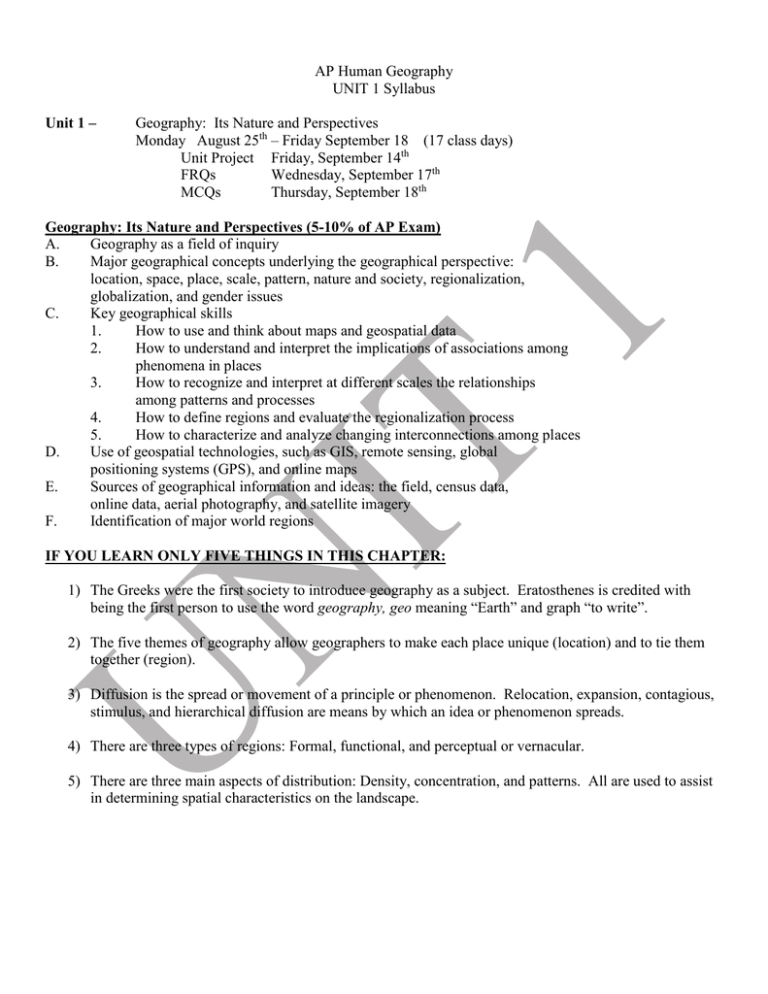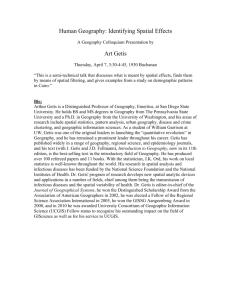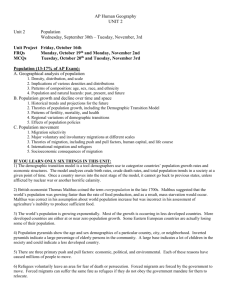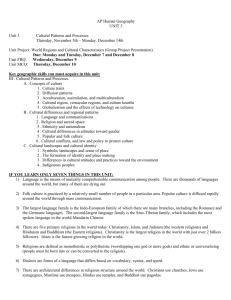UNIT 1 AP Human Geography UNIT 1 Syllabus Unit 1 – Geography
advertisement

AP Human Geography UNIT 1 Syllabus Unit 1 – Geography: Its Nature and Perspectives Monday August 25th – Friday September 18 (17 class days) Unit Project Friday, September 14th FRQs Wednesday, September 17th MCQs Thursday, September 18th Geography: Its Nature and Perspectives (5-10% of AP Exam) A. Geography as a field of inquiry B. Major geographical concepts underlying the geographical perspective: location, space, place, scale, pattern, nature and society, regionalization, globalization, and gender issues C. Key geographical skills 1. How to use and think about maps and geospatial data 2. How to understand and interpret the implications of associations among phenomena in places 3. How to recognize and interpret at different scales the relationships among patterns and processes 4. How to define regions and evaluate the regionalization process 5. How to characterize and analyze changing interconnections among places D. Use of geospatial technologies, such as GIS, remote sensing, global positioning systems (GPS), and online maps E. Sources of geographical information and ideas: the field, census data, online data, aerial photography, and satellite imagery F. Identification of major world regions IF YOU LEARN ONLY FIVE THINGS IN THIS CHAPTER: 1) The Greeks were the first society to introduce geography as a subject. Eratosthenes is credited with being the first person to use the word geography, geo meaning “Earth” and graph “to write”. 2) The five themes of geography allow geographers to make each place unique (location) and to tie them together (region). 3) Diffusion is the spread or movement of a principle or phenomenon. Relocation, expansion, contagious, stimulus, and hierarchical diffusion are means by which an idea or phenomenon spreads. 4) There are three types of regions: Formal, functional, and perceptual or vernacular. 5) There are three main aspects of distribution: Density, concentration, and patterns. All are used to assist in determining spatial characteristics on the landscape. In-Class Activity Due This Day Assigned Reading Getis 81-84, 90-96 Getis 99113; Fouberg 816 Monday, August 24th, 2015 Tuesday, August 25, 2015 Wednesday, August 26, 2015 Thursday, August 27, 2015 Day 1 Blue Cards & Handout Syllabus Day 2 Summer Reading Quiz/Laptop Introduction Day 3 Guest Speaker Day 4 How To/Clicker Check Getis 81-84, 9096 Friday, August 28, 2015 Day 5 Notecards Monday, August 31, 2015 Tuesday, September 01, 2015 Wednesday, September 02, 2015 Thursday, September 03, 2015 Friday, September 04, 2015 Monday, September 07, 2015 Tuesday, September 08, 2015 Day 6 Vocabulary Quiz: Weather, climate, jet streams, monsoon, North Atlantic Drift, Precipitation, relative humidity, Convectional precipitation, orographic precipitation, cyclonic precipitation, and air masses. Climate Regions: Lecture Day 7 Physical Geography/Clicker Check Getis 99-113; Fouberg 8-16 Fouberg 1625, Getis 615 Day 8 Basic Geographic Skills Day 9 Clicker Check/Introduction to Human Geography Fouberg 16-25, Getis 6-15 Getis 21-34 Fouberg 2635 Day 10 Vocab Quiz Notecards Clicker Check Getis 21-34 Fouberg 26-35 Fouberg A-1 thru A-9, Getis A-1 thru A-7 Clicker Check Fouberg A-1 thru A-9, Getis A-1 thru A-7 Getis 35-47 Day 11 Day 12 Wednesday, Day 13 September 09, 2015 Thursday, Day 14 September 10, 2015 Friday, September 11, 2015 Monday, September 14, 2015 Tuesday, September 15, 2015 Wednesday, September 16, 2015 Thursday, September 17, 2015 Friday, September 18, 2015 Monday, September 21, 2015 Tuesday, September 22, 2015 Wednesday, September 23, 2015 Thursday, September 24, 2015 Friday, September 25, 2015 Monday, September 28, 2015 Tuesday, September 29, 2015 Day 15 Vocab Quiz Notecards Clicker Check Getis 35-47 Vocab Quiz Notecards Day 16 Day 17 Day 18 Day 19 Day 20 Day 21 Day 22 Day 23 Day 24 Day 25 Unit 1 Project Due by 8:30 A.M. Day 26 FRQ Test Day 27 MCT Test Key Terms* *YOU are responsible for all bolded terms in the text for each reading section. Just because a term does not appear below does NOT mean it will not appear on the weekly quiz. Absolute direction Absolute distance Absolute location Accessibility Activity Spaces Area Analysis Tradition Area Cartogram (value-by-area map) Azimuthal Projections Cartography Chropleth Map Climatic Regions Conformal Projections Connectivity Contour interval Contour line Cultural Ecology Cultural Landscape Culture-Environment Tradition Distance Earth Science Tradition Environmental Determinism Epidemic Equal area (equivalent projections) Equidistant Projections Five Themes Flow-Line maps Formal Region Functional (nodal) region Geocaching Geographic Database Geographic Grid Geographic Information System (GIS) Gernalized Map Global Positioning System (GPS) Globalization Globe Properties Human Environment Human Geography International Date Line Isoline Isotherms Koppen Climate Classification System Landsat Satellites Landscape Latitude Location Location Theory Locational Tradition Longitude Map Projection Medical Geography Mental Maps Movement Natural Landscape Pandemic Pattern Perceptions of places Perceptual (vernacular/popular) region Perceptual regions Place Possibilism Prime Meridian Reference Maps Region Regions Relative direction Relative Distance Relative location Remote Sensing Rescale Scale Sense of Place Sequent Occupancy Site Situation Spatial Spatial Diffusion Spatial distribution Spatial interaction Spatial Perspective Thematic Maps Topographic Maps




